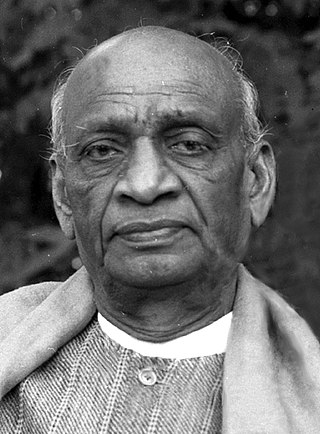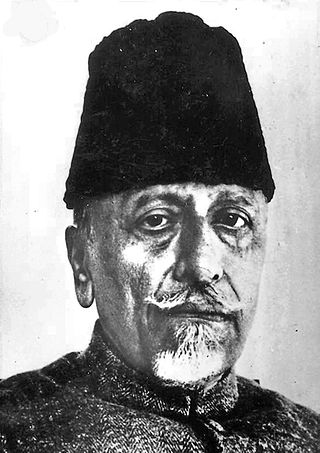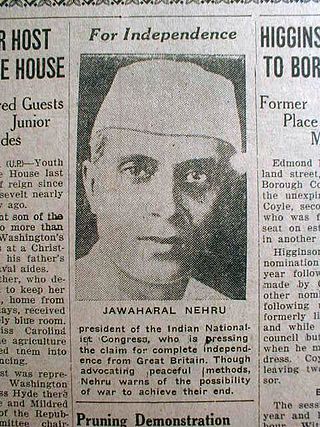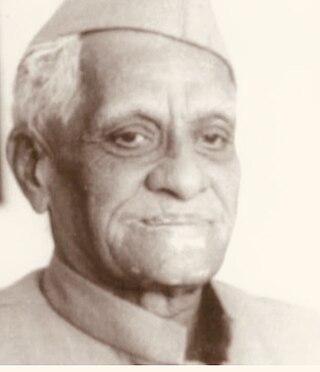Related Research Articles

Vallabhbhai Jhaverbhai Patel, commonly known as Sardar Vallabhbhai Patel, was an Indian independence nationalist and barrister who served as the first Deputy Prime Minister and Home Minister of India from 1947 to 1950. He was a senior leader of the Indian National Congress, who played a significant role in the country's struggle for independence and its political integration. In India and elsewhere, he was often called Sardar, meaning "Chief" in Hindi, Urdu, Bengali and Persian. He acted as the Home Minister during the political integration of India and the Indo-Pakistani War of 1947.

Pingali Venkayya was an Indian freedom fighter. He was the designer of the flag on which the initial Indian National Flag was based. He was also a lecturer, author, geologist, educationalist, agriculturist, and a polyglot.

The non-cooperation movement was a political campaign launched on 4 September 1920, by Mahatma Gandhi to have Indians revoke their cooperation from the British government, with the aim of persuading them to grant self-governance.

Abul Kalam Ghulam Muhiyuddin Ahmed bin Khairuddin Al-Hussaini Azad ; 11 November 1888 – 22 February 1958) was an Indian independence activist, writer and a senior leader of the Indian National Congress. Following India's independence, he became the First Minister of Education in the Indian government. He is commonly remembered as Maulana Azad; the word Maulana is an honorific meaning 'Our Master' and he had adopted Azad (Free) as his pen name. His contribution to establishing the education foundation in India is recognised by celebrating his birthday as National Education Day across India.

The national flag of India, colloquially called Tiraṅgā, is a horizontal rectangular tricolour flag, the colours being of India saffron, white and India green; with the Ashoka Chakra, a 24-spoke wheel, in navy blue at its centre. It was adopted in its present form during a meeting of the Constituent Assembly held on 22 July 1947, and it became the official flag of the Union of India on 15 August 1947. The flag was subsequently retained as that of the Republic of India. In India, the term "tricolour" almost always refers to the Indian national flag.

Asrar-ul-Haq, better known as Majaz Lakhnawi, was an Indian Urdu poet. He is known for his romantic and revolutionary poetry. He composed ghazals and nazms in Urdu. He was the maternal uncle of poet and screenplay writer Javed Akhtar and Indian-American psychoanalyst Salman Akhtar.

Irfan Habib is an Indian Marxist historian of ancient and medieval India, following the methodology of Marxist historiography in his contributions to economic history. He identifies as a Marxist and is well known for his strong stance against Hindutva and Islamic fundamentalism. He has authored a number of books, notably the Agrarian System of Mughal India, 1556–1707, an Atlas of the Mughal Empire: Political and Economic Maps With Detailed Notes, and an Atlas of Ancient Indian History. As the general editor, he is also the driving force behind the A People's History of India series, volumes of which continue to be released.

Indian nationalism is an instance of territorial nationalism, which is inclusive of all of the people of India, despite their diverse ethnic, linguistic and religious backgrounds. Indian nationalism can trace roots to pre-colonial India, but was fully developed during the Indian independence movement which campaigned for independence from British rule. Indian nationalism quickly rose to popularity in India through these united anti-colonial coalitions and movements. Independence movement figures like Mahatma Gandhi and Jawaharlal Nehru spearheaded the Indian nationalist movement. After Indian Independence, Nehru and his successors continued to campaign on Indian nationalism in face of border wars with both China and Pakistan. After the Indo-Pakistan War of 1971 and the Bangladesh Liberation War, Indian nationalism reached its post-independence peak. However by the 1980s, religious tensions reached a melting point and Indian nationalism sluggishly collapsed. Despite its decline and the rise of religious nationalism; Indian nationalism and its historic figures continue to strongly influence the politics of India and reflect an opposition to the sectarian strands of Hindu nationalism and Muslim nationalism.

Abbas Tyabji was an Indian freedom fighter from Gujarat, and an associate of Mahatma Gandhi. He also served as the Chief Justice of Baroda State. His grandson is historian Irfan Habib.

The Declaration of Purna Swaraj was a resolution which was passed in 1930 because of the dissatisfaction among the Indian masses regarding the British offer of Dominion status to India. The word Purna Swaraj was derived from Sanskrit पूर्ण (Pūrṇa) 'Complete', and स्वराज (Svarāja) 'Self-rule or Sovereignty', or Declaration of the Independence of India, it was promulgated by the Indian National Congress, resolving the Congress and Indian nationalists to fight for Purna Swaraj, or complete self-rule/total independence from the British rule

Nawab Mir Akbar Ali Khan was governor of Uttar Pradesh in India from 1972 to 1974 and governor of Odisha from 25 October 1974 to 17 April 1976. He was a member of the Rajya Sabha for 18 years and he was deputy chairperson of the Rajya Sabha for 12 years. He was associated with Osmania University and was a member of the Senates of Aligarh Muslim University, Jamia Millia Islamia and Jawaharlal Nehru University. Later in 1957 he founded a Polytechnic in Hyderabad.

Badruddin Tyabji was an Indian lawyer, activist, and politician during the British Raj. Tyabji was the first Indian to practice as a barrister of the High Court of Bombay who served as the third President of the Indian National Congress. He was one of the founding member and first Muslim president of Indian National Congress. He founded the Anjuman-i-Islam College in Bombay in 1874. It started with one school and today it has more than eighty institutions from pre-primary schools to graduate and postgraduate level. Tyabji is often referred to as one of the most prominent members of Tyabji family.

Lal Chowk is a city square in Srinagar, in the Indian union territory of Jammu and Kashmir.

Mohammad Habib (1895–1971) was an Indian Marxist historian, who worked at the Aligarh Muslim University. He was involved in the Indian Independence movement, and was an associate of both Gandhi and Jawaharlal Nehru.
Saif Faiz Badruddin Tyabji (1904–1957) was a solicitor, mathematician, an educationist passionately devoted to the cause of female education, and a nationalist committed to the idea of India. He was closely associated with the Anjuman-i Islam of Bombay from the 1930s till his death in November 1957. He was a Congress Member of Parliament in 1957 from Jalna in Maharashtra.

The Tyabji family, also known as Tyabji-Hydari,Tyabji-Fyzee, and Tyabji-Futehally family, consists of Mullah Tyab Ali and his descendants. The Tyabji family has gained fame for its exhaustive involvement in India's independence movement with individuals being prominent politicians, diplomats, academics, scientists, activists, and athletes. Other members gained prominence for their roles in India's Navy and Air Force and contribution to Indian film and fine art. Individuals within the Tyabji family belong to the Indian royal families of the Nizam of Hyderabad, the Nawab of Bengal, Raja of Wanaparthy, and the Nawab of Janjira. "The Tagores and the Tyabjis are the rarities for India and they are her friends" - Mahatma Gandhi.
Ahmereen Reza is a British Pakistani architect, social worker and political activist. Her academic and professional interests have centred on revitalisation of low income and ethnic minority rich neighbourhoods through a combination of enhanced community participation, imparting skills training to create employment opportunities, informing policy on low-income housing, and the empowerment of local women.

Kamila Tyabji was an Indian philanthropist and lawyer. As a lawyer, Tyabji was renowned for being London's only woman barrister and the first to argue a case before the Privy Council.
Surayya Tyabji was an Indian artist, who contributed to the design of today’s Indian National Flag.
References
- ↑ "Badruddin Tayabji, News Photo, The Times of India captures in". Timescontent.com. Archived from the original on 4 March 2016. Retrieved 5 January 2016.
- ↑ Reed, Sir Stanley (1961). "The Times of India Directory and Year Book Including Who's Who" . Retrieved 5 January 2016.
- ↑ "Aligarh Muslim University || Public Relations Officer". Amu.ac.in. Archived from the original on 25 December 2018. Retrieved 5 January 2016.
- ↑ Metcalf, Barbara D. (8 September 2009). Islam in South Asia in Practice. Princeton University Press. p. 295. ISBN 978-1400831388 . Retrieved 5 January 2016.
- ↑ "Matches for Badruddin Faiz Tyabji, ICS". MyHeritage. Retrieved 5 January 2016.
- ↑ "India and the European Union Milestones -PDF" (PDF). Archived from the original (PDF) on 11 July 2020. Retrieved 10 April 2016.
- ↑ Prince who was envoy in '47
- ↑ "Previous Indian Ambassadors to the Federal Republic of Germany". Archived from the original on 22 April 2018. Retrieved 11 April 2016.
- ↑ Khan, Naseem (15 June 2004). "Kamila Tyabji". The Guardian. ISSN 0261-3077 . Retrieved 10 February 2024.
- ↑ Royle, Trevor (1989). The Last Days of the Raj. Joseph. ISBN 9780718129040.
- ↑ "This Woman Made a Big Contribution in Designing the Indian Flag and Sadly, No One Knows Who She is". 12 November 2015. Archived from the original on 18 August 2017. Retrieved 17 August 2017.
- ↑ "My India My Pride - Indian Tricolor - Know India: National Portal of India". knowindia.india.gov.in. Archived from the original on 7 March 2023. Retrieved 4 May 2023.
- ↑ Brussels in winter
- ↑ "Family tree of Faiz Hasan Tyabji (a Bombay High Court judge). It shows his father as Badruddin Tyabji (the Congress leader), and his son as Badruddin Tyabji (the ICS officer)". 24 December 1877. Archived from the original on 28 April 2016. Retrieved 11 April 2016.